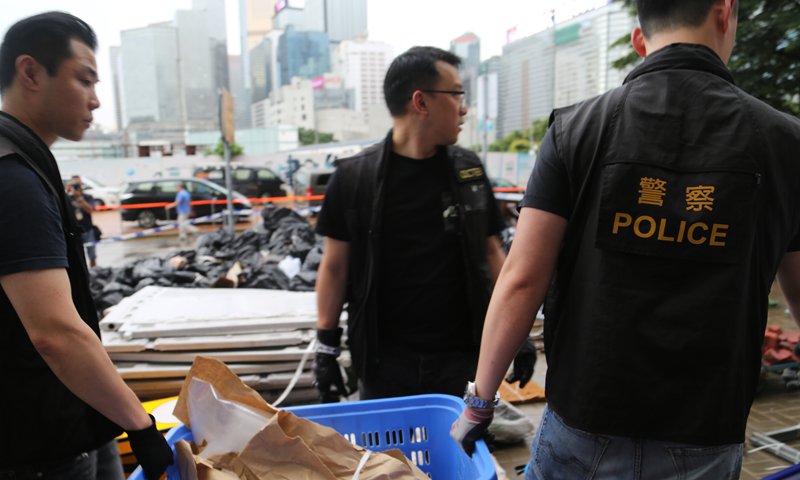Pocari Sweat urged not to take wrong stance on Hong Kong
By Chen Qingqing and Song Lin Source:Global Times Published: 2019/7/10 20:49:26

Hong Kong police are collecting evidence from the LegCo Complex of Hong Kong which was stormed and ransacked by violent protesters on July 1. Photo: Chen Qingqing and Yang Sheng/GT
Hong Kong broadcaster TVB accused Otsuka Pharmaceutical Company of appeasing Hong Kong protesters by its decision to withdraw advertising for the Pocari Sweat sports drink from the channel over alleged bias in favor of the police in TVB's reporting of the extradition bill protests.
The response came after Japan's Otsuka Pharmaceutical Company pulled its advertising for the Pocari Sweat sports drink from TVB, a Hong Kong television broadcast and media company.
A TVB spokesperson said on Wednesday that they were extremely regretful about Pocari Sweat's statement.
"TVB has objectively reported on protesters who violently stormed LegCo, allowed the audience to witness the scene through multiple angles and to understand the actions taken by the police in the face of the environment at that time, including the dispersion of the demonstrators. The reporting has had a far-reaching influence. Meanwhile, our ad clients have been threatened by radical protesters and were asked to withdraw ads placed on TVB," a TVB spokesperson told the Global Times. He requested anonymity.
"Pocari Sweat's comments are designed to please protesters, which equals to bowing to violence," he said.
Otsuka Pharmaceutical Company issued a statement on Wednesday night saying that "we sincerely apologize that our reply dated July 9 have led to inconvenience."
Chinese analysts said the Japanese company would likely face tough sanctions in the mainland for adopting a wrong stance.
Otsuka Pharmaceutical Co has withdrawn advertising from all TVB platforms, according to a statement seen by the Global Times on Wednesday.
An Otsuka Pharmaceutical Co public relations employee at its Tokyo headquarters confirmed the decision was made by the Hong Kong branch based on business, rather than political considerations.
The staff member asked not to be named, but said the Japanese company's headquarters had given no instructions before the decision was made by its Hong Kong branch and whether that decision was temporary or permanent awaited further discussion.
In the current sensitive situation, the company's move was "very indiscreet," said Tian Feilong, an associate professor at Beijing University of Aeronautics and Astronautics.
"Even though the decision might have been based on business considerations as they explained, it was still rather misleading," Tian said.
Different Hong Kong media reacted differently to the ongoing demonstrations in the city, with the daily paper Ming Pao lambasting the reckless behavior of protesters.
Some media organizations in Hong Kong have blindly followed the protesters' narratives without respecting basic principles of journalism.
TVB's unbiased coverage of the radical protests was punished as it was disliked by opposition groups, Hong Kong residents told the Global Times.
TVB was also targeted online by some radical activists.
Yiu Wai Lam, a resident of Kwun Tong, denounced some of the Hong Kong and overseas media coverage that had come out in support of radical protesters.
"If they only air footage of the police attacking the public but no footage of radical protesters challenging the police, how can the public make the right judgment?" Yiu told the Global Times.
"It is a question of the position. As a Japanese firm, it stands with Japan, which is an ally of the US. Of course it takes a supportive stance for Hong Kong opposition groups," a local resident surnamed Lee told the Global Times.
Clearly, Pocari Sweati is now yielding to the violence, another local resident Li said.
However, Hong Kong opposition-related platforms hailed the decision.
"TVB has taken a lukewarm stand on the anti-extradition bill protests and continuously ignored people's requests to voice their demands," according to a pro-opposition account on Facebook.
Another group organized by young Hong Kong people in opposition to the extradition law said Tuesday that the beverage should be preferred product for Hong Kong demonstrations and urged Hong Kong citizens to show their support for the decision by buying up all Pocari Sweat products.
As Hong Kong opposition groups cheered on Pocari Sweat, some Chinese mainland net users expressed outrage, calling for the Japanese beverage brand to get out of China if it supports Hong Kong secessionists.
A growing number of internet users left angry messages on the Japanese company's official account on China's Twitter-like Weibo platform on Wednesday.
If any foreign company adopted a wrong political stance such as supporting Hong Kong independence in blatant violation of the Basic Law, they would face strict sanctions, Tian emphasized.
Newspaper headline: Firm under fire for pulling ad